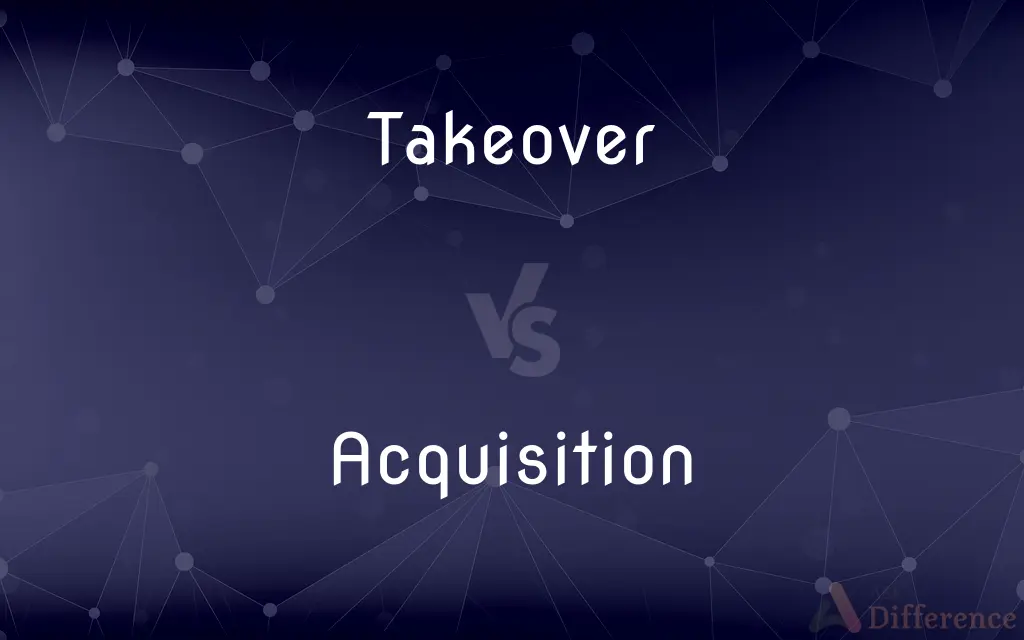Takeover vs. Acquisition — What's the Difference?
By Tayyaba Rehman — Updated on September 14, 2023
A takeover is when one company gains control of another, often without mutual agreement, while an acquisition refers to one company purchasing a significant part or all of another company, typically consensual.

Difference Between Takeover and Acquisition
Table of Contents
ADVERTISEMENT
Key Differences
Both Takeover and Acquisition are terms frequently used in the corporate world, particularly when discussing mergers and corporate strategies. A takeover refers to one company gaining control over another. This process might be hostile or friendly, but the primary distinction is that the control is transferred from one entity to another. In contrast, an acquisition is the act of obtaining or purchasing a significant portion or all of another company. This action typically indicates a form of agreement or mutual understanding between the parties involved.
In the realm of corporate strategy, a takeover might often be perceived as more aggressive. It suggests that one company is superseding another, possibly against the latter's wishes. An acquisition, on the other hand, often implies a more mutual agreement where one company sees value in incorporating another company or its assets into its operations. Both terms, however, underline a shift in business ownership and potentially a change in corporate strategy.
While all takeovers involve some form of acquisition (acquiring control), not all acquisitions result in a takeover. For instance, a company might acquire a division or certain assets of another company without taking control of the entire entity. Such an acquisition does not change the overarching control of the target company.
It's also essential to understand the legal and regulatory implications of both actions. In many jurisdictions, takeovers, especially hostile ones, might face more stringent regulations to ensure fair play and protect minority shareholders. Acquisitions, particularly those that are mutual, often undergo rigorous due diligence processes to protect both parties' interests.
Comparison Chart
Definition
One company gaining control over another.
Purchasing significant part or all of another company.
ADVERTISEMENT
Implication
Can be hostile or friendly.
Typically consensual.
Legal Connotations
Might face stringent regulations.
Involves rigorous due diligence.
Perception
Often seen as aggressive.
Viewed as mutual or strategic.
Result
Change in control of the target company.
Can involve integration or maintaining separate entities.
Compare with Definitions
Takeover
Gaining control of a company through stock purchase or exchange.
The tech giant's takeover of the startup was unexpected.
Acquisition
The act of gaining possession or ownership.
The recent acquisition of the rare artwork was the talk of the town.
Takeover
A change in the controlling interest of a company.
The news about the potential takeover sent the company's stock soaring.
Acquisition
A corporate action where a company buys most or all of another firm's ownership stakes.
The acquisition strategy was aimed at expanding their market presence.
Takeover
An assumption of control, especially without agreement.
The hostile takeover bid was met with resistance by the board.
Acquisition
The process of purchasing another company or its assets.
The acquisition was announced in a joint press release.
Takeover
Superseding another company's management and operations.
Rumors about a takeover were circulating in the industry.
Acquisition
Incorporating something new, especially a tangible asset.
The company's acquisition of new equipment improved efficiency.
Takeover
The act of one company becoming the new owner of another.
The takeover was finalized after months of negotiations.
Acquisition
An asset or object bought or obtained, typically by a library or museum
The legacy will be used for new acquisitions
Takeover
In business, a takeover is the purchase of one company (the target) by another (the acquirer, or bidder). In the UK, the term refers to the acquisition of a public company whose shares are listed on a stock exchange, in contrast to the acquisition of a private company.
Acquisition
The learning or developing of a skill, habit, or quality
The acquisition of management skills
Takeover
The act or an instance of assuming control or management of or responsibility for something, especially the seizure of power, as in a nation, political organization, or corporation.
Acquisition
The act of acquiring.
Takeover
The performing of an action or a play in a game again after the first performance has been discounted or is under dispute.
Acquisition
Something acquired or gained
Added two new acquisitions to my library.
Takeover
(economics) The purchase of one company by another; a merger without the formation of a new company, especially where some stakeholders in the purchased company oppose the purchase.
Acquisition
The act or process of acquiring.
The acquisition of sports equipment can be fun in itself.
Takeover
The acquisition of a public company whose shares are listed on a stock exchange, in contrast to the acquisition of a private company.
Acquisition
The thing acquired or gained; a gain.
That graphite tennis racquet is quite an acquisition.
Takeover
A time or event in which control or authority, especially over a facility is passed from one party to the next.
Acquisition
(computing) The process of sampling signals that measure real world physical conditions and converting these signals into digital numeric values that can be manipulated by a computer.
Takeover
Alternative form of take over
Acquisition
The act or process of acquiring.
The acquisition or loss of a province.
Takeover
The acquisition of ownership of one company by another company, usually by purchasing a controlling percentage of its stock or by exchanging stock of the purchasing company for that of the purchased company. It is a hostile takeover if the management of the company being taken over is opposed to the deal. A hostile takeover is sometimes organized by a corporate raider.
Acquisition
The purchase of one commercial enterprise by another, whether for cash, or in a trade of stock of the purchasing company for that of the purchased company.
Takeover
A sudden and decisive change of government illegally or by force
Acquisition
The thing acquired or gained; an acquirement; a gain; as, learning is an acquisition.
Takeover
A change by sale or merger in the controlling interest of a corporation
Acquisition
The act of contracting or assuming or acquiring possession of something;
The acquisition of wealth
The acquisition of one company by another
Acquisition
Something acquired;
A recent acquisition by the museum
Acquisition
The cognitive process of acquiring skill or knowledge;
The child's acquisition of language
Acquisition
An ability that has been acquired by training
Acquisition
The act of acquiring or obtaining control of something.
The company's latest acquisition was a smaller firm in Europe.
Common Curiosities
Which is more common: takeover or acquisition?
Acquisitions are more common, as they encompass a broader range of corporate actions.
Is acquisition the same as a merger?
Not necessarily. A merger typically involves two companies forming a new entity, while an acquisition is one company buying another.
Why do companies pursue takeovers?
For various reasons, including gaining market share, eliminating competition, or accessing new resources.
Is a takeover always hostile?
No, takeovers can be friendly or hostile, depending on the circumstances.
Can an acquisition occur without a change in control?
Yes, a company can acquire parts of another without taking full control.
What's a "friendly" takeover?
It's when the target company agrees to be acquired or controlled by another.
What's a defensive strategy against a hostile takeover?
Companies might adopt measures like poison pills or white knights to deter hostile takeovers.
How do shareholders benefit from a takeover?
They might receive a premium for their shares or benefit from the combined company's future growth.
Is regulatory approval needed for acquisitions?
Often, especially for large acquisitions that might affect market competition.
Can a small company take over a larger one?
It's rare, but possible, especially if the smaller company has significant financial backing.
Why do some acquisitions fail?
Reasons can include cultural clashes, financial issues, or poor integration strategies.
What's a leveraged buyout (LBO)?
It's a type of acquisition where the purchase is financed mostly through debt.
Is an acquisition always expensive?
Not always. The cost depends on the target's value and the terms negotiated.
Why are acquisitions common in the tech industry?
To acquire new technologies, talent, or to eliminate competition.
How long does the acquisition process typically last?
It varies but can take anywhere from a few months to several years, depending on complexities and negotiations.
Share Your Discovery

Previous Comparison
Survey vs. Observation
Next Comparison
Hypoechoic vs. HyperechoicAuthor Spotlight
Written by
Tayyaba RehmanTayyaba Rehman is a distinguished writer, currently serving as a primary contributor to askdifference.com. As a researcher in semantics and etymology, Tayyaba's passion for the complexity of languages and their distinctions has found a perfect home on the platform. Tayyaba delves into the intricacies of language, distinguishing between commonly confused words and phrases, thereby providing clarity for readers worldwide.
















































